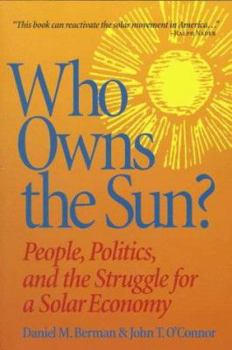Who Owns the Sun?: People, Politics, and the Struggle for a Solar Economy
Select Format
Select Condition 
Book Overview
In Who Owns the Sun? Daniel Berman and John O'Connor argue that democratic control of solar energy is the key to revitalizing America -- putting power back into the hands of local people. A... This description may be from another edition of this product.
Format:Paperback
Language:English
ISBN:189013208X
ISBN13:9781890132088
Release Date:January 1997
Publisher:Chelsea Green Publishing Company
Length:356 Pages
Weight:1.20 lbs.
Dimensions:0.8" x 6.1" x 9.1"
Customer Reviews
4 ratings
Why did the U.S. drop the solar ball?
Published by Thriftbooks.com User , 16 years ago
Why did the U.S. drop the ball on solar power? Did it somehow prove uneconomic? Was the widespread sun-thusiasm evident in the 70s misplaced? Here's a book full of answers to questions you may not have known to ask. Here's a book touted as the match that will rekindle the drive for renewable, community controlled power generation; a carefully documented story about the concerted effort of oil and power companies to bury solar. Sadly, it didn't work ... yet, at least. But more and more people are coming to understand what's at stake. Yes they bought the patents and suppressed them. Yes they ran a tightly controlled disinformation campaign. Yes they bought presidents and congressional representatives. And more. Commercial interests took the U.S. from world leadership in renewable power to also-ran status. While Israel, Japan and others moved full tilt toward sustainability we bombed Iraq to keep cheap (sic) petroleum flowing. And then we bombed Iraq again and oil has hit $100 a barrel. The authors will enrage you at being duped and fire your desire for change. Here comes the sun!
Best primer on ups and downs of solar industry
Published by Thriftbooks.com User , 18 years ago
Using the sun as a source of heat and power is such an obvious no-brainer, it has attracted forward-thinking types for many years. But the solar industry still limps along, barely viable. Without state subsidies - which now exist in many states - residential solar energy is not economically viable (translation: it costs a lot more than the electricity in your wall outlets.) Even with state subsidies, few people install solar unless they are ecologically conscious. Why? How could the source of all life in our solar system not support viable businesses? This book recounts - in great detail - the history and politics of the solar industry. It shows how again and again solar power has seemed on the verge of taking off, only to crash back to earth again. The authors are solar advocates, and at times they go overboard in seeing conspiracies around every corner. Electric and oil companies are not all-powerful, although this book sometimes make them seem that way. Still, the book is invaluable for anyone seeking to understand why and how solar power will finally catch on, as I believe must happen. It is well-researched and comprehensive, and I recommend it.
Informative
Published by Thriftbooks.com User , 24 years ago
John T Oconnor has some great insights into the reasons why solar energy is not more readily available and in use. Great Book
Pulls you out of your seat and reveals the reality of solar.
Published by Thriftbooks.com User , 25 years ago
"Who Owns the Sun?" is a densely packed, well written book with many surprising and practical revelations about where solar energy technology came from, how it has developed in the U.S. and where it presently stands. Drawing on the history of public vs. private power, the potentially crucial role of organized labor in the solar movement and the decisions being made by those who use energy primarily as a way to make money, Berman and O'Connor give a perceptive look into why our energy mix stands as it does today. By discussing the societal and environmental impacts of this mix we see renewable energy cast in a refreshing light. Gone is the euphoric notion of slapping some photovoltaics on your roof to solve the world's problems. Rather, by looking at the powers who control the energy supply and what they are doing to maintain that control into the future, we get a clear vision of the strategies that need to be considered by people concerned about the direction our world is going in. Cleaner less polluting options exist, but will these paths be followed by the same people who control the show right now? Probably not, and the authors give many lengthy examples as to why they feel this way. Ultimately, "Who Owns the Sun?" exposes much of the energy industry for what it really is, profit driven. By accepting this idea, the logic of the utilities and others controlling our energy fate becomes clear. And by acting on this logic we're able to begin stacking the deck in favor of consumer and environmental driven ideals.





